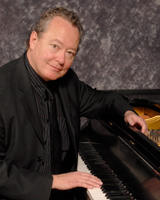SUNDAYS@7, “Scriabin Salute,” Jeffrey Price, piano, Libby Gardner Concert Hall, March 8
Alexander Scriabin’s music has been underrated and under appreciated. A contemporary of Sergei Rachmaninoff, Scriabin has always stood in the other’s shadow. And although coming out of the romantic mold, he broke free from it, unlike Rachmaninoff, and developed his own highly unique style that fused 19th century chromaticism and 20th century atonality into a sophisticated harmonic language.
This year marks the 100th anniversary of Scriabin’s death. To commemorate it, pianist Jeffrey Price of the University of Utah played a well chosen program Sunday evening that gave a wonderful glimpse into Scriabin’s world.
The program included three shorter pieces as well as four of his 10 sonatas that spanned most of Scriabin’s creative life. Price played these with wonderful expressiveness, bringing depth and finely honed definition to each. His technique is such that the demands Scriabin places on the pianist seemed of no consequence — he incorporated the virtuosity and bravura writing into his beautifully sculpted phrasings. His interpretations were well conceived and delivered and he let the music speak for itself.
Price opened with what is ostensibly Scriabin’s most popular and most frequently performed piano piece, the Etude in D sharp minor, op. 8, no. 12. He captured the passion and raw energy of the piece with his dynamic reading that also underscored its Chopinesque lyrical character.
Chopin is also discernible in the next piece Price played, the remarkable Prelude and Nocturne for the left hand, op. 9.
The Vers la Flamme, op. 72, which Price played in the second half, is a totally different piece than the previous two. A late work, Scriabin by that time had incorporated mysticism into his musical language as well as developed a color palette for the musical notes. The piece is an incredibly stunning slow crescendo that exudes an otherworldly aura that was enhanced by the color display onstage and Price’s intensely vibrant playing.
The color display was also employed when Price played the four sonatas.
Of the four sonatas on the program, the Fourth is still the most musically traditional, although there are hints of things to come. Price gave an absolutely captivating account that captured the imagery of the music vividly. His playing was assured and he was completely in command of the music.
The same was also true for the other three sonatas.
The Seventh, which Scriabin called the White Mass, is a diffuse work with complex textures, but Price’s finely sculpted phrasings and clearly defined playing brought depth and definition to the music.
The Tenth, which opened the second half, is lyrical and exudes an air of reflection, but there is more to it than meets the ears. And Price captured the subtleties of the score with his sensitive playing that didn’t miss a thing. His reading was beautifully expressive and eloquently lyrical.
The Fifth Sonata, which some pianists consider to be the most difficult piano piece ever written, ended the evening. In Price’s hands the work received a magnificently virtuosic performance. It was a spectacularly crafted and executed reading that emphasized the music’s mystique and utterly irresistible appeal.

